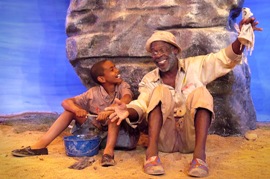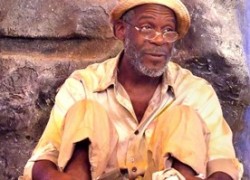
Premier South African playwright Athol Fugard once again puts a personal face on apartheid in his deeply moving two-act drama The Painted Rocks Of Revolver Creek, now getting a gorgeously-acted West Coast Premiere at Fugard’s Los Angeles home, the award-winning Fountain Theatre.
 Fugard sets Painted Rock’s first act in 1981, thirteen years before the fall of the system of national racial segregation that kept the ruling white minority in apartheid (i.e. “the state of being apart”) from the black majority for nearly half a century, then returns post-intermission to a land where, nine years after “Freedom Day” elections saw Nelson Mandela sworn into the presidency, black-and-white relations remain as fraught as ever, if not more so.
Fugard sets Painted Rock’s first act in 1981, thirteen years before the fall of the system of national racial segregation that kept the ruling white minority in apartheid (i.e. “the state of being apart”) from the black majority for nearly half a century, then returns post-intermission to a land where, nine years after “Freedom Day” elections saw Nelson Mandela sworn into the presidency, black-and-white relations remain as fraught as ever, if not more so.
Though all this might seem the stuff of a History Channel documentary, in Fugard’s sublimely human hands, we see nation-altering events through one black South African’s eyes.
 The man’s name is Jonathan Sejake, whom we first meet as “Bokkie” (Philip Solomon), a precocious eleven-year-old whose Sundays are spent in the company of elderly farm worker “Tata” (Thomas Silcott), whose real name is of as little import to Afrikaner farm owner’s wife Elmarie Kleynhans (Suanne Spoke) as Bokkie’s, though she has come to love the more than one hundred stone “flowers” the old man has painted during his years of work on the couple’s arid farmland.
The man’s name is Jonathan Sejake, whom we first meet as “Bokkie” (Philip Solomon), a precocious eleven-year-old whose Sundays are spent in the company of elderly farm worker “Tata” (Thomas Silcott), whose real name is of as little import to Afrikaner farm owner’s wife Elmarie Kleynhans (Suanne Spoke) as Bokkie’s, though she has come to love the more than one hundred stone “flowers” the old man has painted during his years of work on the couple’s arid farmland.
Only a single rock, by far the largest, remains untouched on this Sunday in 1981, though not for long, and it will not be painted in the style of the smaller ones that surround it. “We are going to give The Big One eyes,” Tata explains to Bokkie, “so that he can see me now when I stand here,” profound words indeed for a man who has gone through his own life unseen and unknown.
Unfortunately for Tata and Bokkie, who should interrupt their Sunday painting but a crucifix-and-Bible-sporting Elmarie, who in the kindest-sounding (though hardly kindly intended) words orders Tata to repaint the rock to resemble the others, words which shake Bokkie to his eleven-year-old core, so much so that he is compelled twenty-two years later to return to the Kleynhans farm to restore his mentor’s work to its original freshly painted state.
 “Welcoming” the adult Jonathan (Gilbert Glenn Brown) back with a pistol she is more than willing to fire is an Elmarie turned hard as nails against the fear that this black stranger may pose as great a threat to her and her now infirm husband as the marauders who only days before tortured a neighboring couple to their deaths.
“Welcoming” the adult Jonathan (Gilbert Glenn Brown) back with a pistol she is more than willing to fire is an Elmarie turned hard as nails against the fear that this black stranger may pose as great a threat to her and her now infirm husband as the marauders who only days before tortured a neighboring couple to their deaths.
Dramatic fireworks ensue between land owner and trespasser, and heaven willing some sort of reconciliation, though the latter is far from insured given how far apart the once wide-eyed boy and once kind-eyed woman have grown over the past two decades.
Though Fugard’s dialog can veer into polemic waters, particularly as Jonathan and Elmarie’s 2003 meeting takes on a political bent, all-around superb performances more than overcome this potential minus under Simon Levy’s richly nuanced direction, the cast’s assignments made easier by the empathy Fugard so clearly feels for each and every one of his characters, through whose eyes we see lives that are the farthest thing from black and white.
 Silcott’s exquisite work as Tata (inspired by real-life South African “stone garden” artist Nukain Mabuza) is so real, it transcends the realm of acting, and his performance is complemented by the thoroughly winning Solomon, whose South African accent sounds so authentic that it comes as a bit of a shock to realize that he is the same Santa Ana seventh-grader who sang and danced along to LMFAO’s “Party Rock Anthem” in last year’s Pasadena Playhouse Panto.
Silcott’s exquisite work as Tata (inspired by real-life South African “stone garden” artist Nukain Mabuza) is so real, it transcends the realm of acting, and his performance is complemented by the thoroughly winning Solomon, whose South African accent sounds so authentic that it comes as a bit of a shock to realize that he is the same Santa Ana seventh-grader who sang and danced along to LMFAO’s “Party Rock Anthem” in last year’s Pasadena Playhouse Panto.
As for the adult Bokkie (proudly reclaiming his identity as Jonathan Sejake), Fountain Theatre favorite Brown tops even his work in The Brothers Size, giving us a man who has overcome poverty though education and determination and who is not about to see his beloved Tata’s lifework erased by wind and rain and neglect.
 Arguably most memorable of all is the sensational Spoke, giving in effect two performances since whatever softer edges may have tempered the Afrikaner farmer’s wife in Act One have vanished once Elmarie returns for the second act rock-hard and merciless in face of an unarmed intruder whose only real sin may be the color of his skin.
Arguably most memorable of all is the sensational Spoke, giving in effect two performances since whatever softer edges may have tempered the Afrikaner farmer’s wife in Act One have vanished once Elmarie returns for the second act rock-hard and merciless in face of an unarmed intruder whose only real sin may be the color of his skin.
Jeff McLaughlin transforms the Fountain Theatre stage in a scenic design reminiscent of the one he created for Fugard’s The Train Driver, covering the stage floor in layers of dirt and surrounding the audience with a radiant blue African sky, though this time round there are a dozen or more of Nukain Mabuza’s stone flowers to add color and vibrancy to the panorama.
Jennifer Edwards lights McLaughlin’s set, Dillon Nelson’s detailed prop and set dressing design, and Naila Aladdin-Sanders’ character-defining costumes to perfection, with Peter Bayne’s beautiful original music and outdoors-evocative sound design completing a superb production design. (Kudos too to dialect coach Nike Doukas and Afrikaans consultant Angelique Pretorius.)
The Painted Rocks At Revolver Creek is produced by Stephen Sachs and Deborah Lawlor. Rita Cofield is production stage manager. Scott Tuomey is technical director.
I loved Athol Fugard’s “Master Harold”…and the Boys, the masterpiece that introduced the South African playwright to the world, then found myself considerably less fond of The Train Driver, a play I described in my review as wordy and unengaging (though admittedly I was in the minority on that).
The Painted Rocks At Revolver Creek has restored my faith in Fugard and made me want to see more of South Africa’s most renowned playwright. It informed, inspired, and most importantly touched me in a way I did not see coming. Like Reborning and I And You earlier this year, it is The Fountain Theatre at its world-class best.
The Fountain Theatre, 5060 Fountain Ave., Los Angeles.
www.FountainTheatre.com
–Steven Stanley
November 16, 2015
Photos: Ed Krieger
Tags: Athol Fugard, Fountain Theatre, Los Angeles Theater Review



 Since 2007, Steven Stanley's StageSceneLA.com has spotlighted the best in Southern California theater via reviews, interviews, and its annual StageSceneLA Scenies.
Since 2007, Steven Stanley's StageSceneLA.com has spotlighted the best in Southern California theater via reviews, interviews, and its annual StageSceneLA Scenies.







 COPYRIGHT 2024 STEVEN STANLEY :: DESIGN BY
COPYRIGHT 2024 STEVEN STANLEY :: DESIGN BY